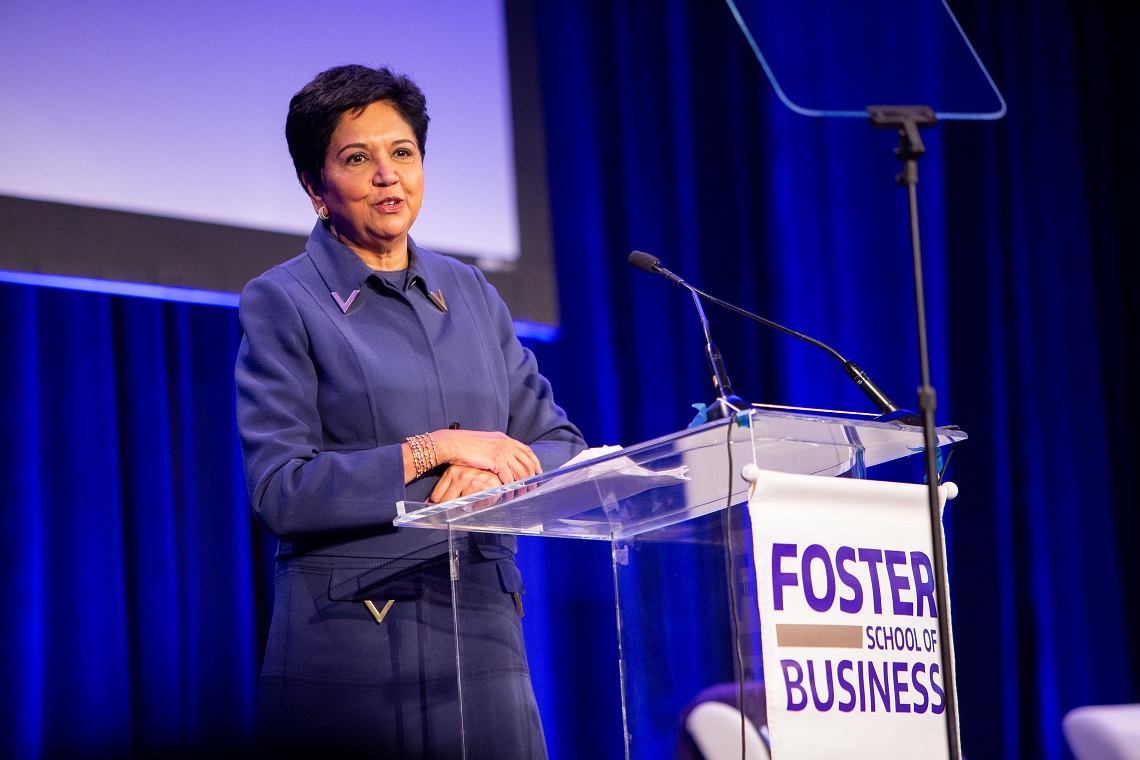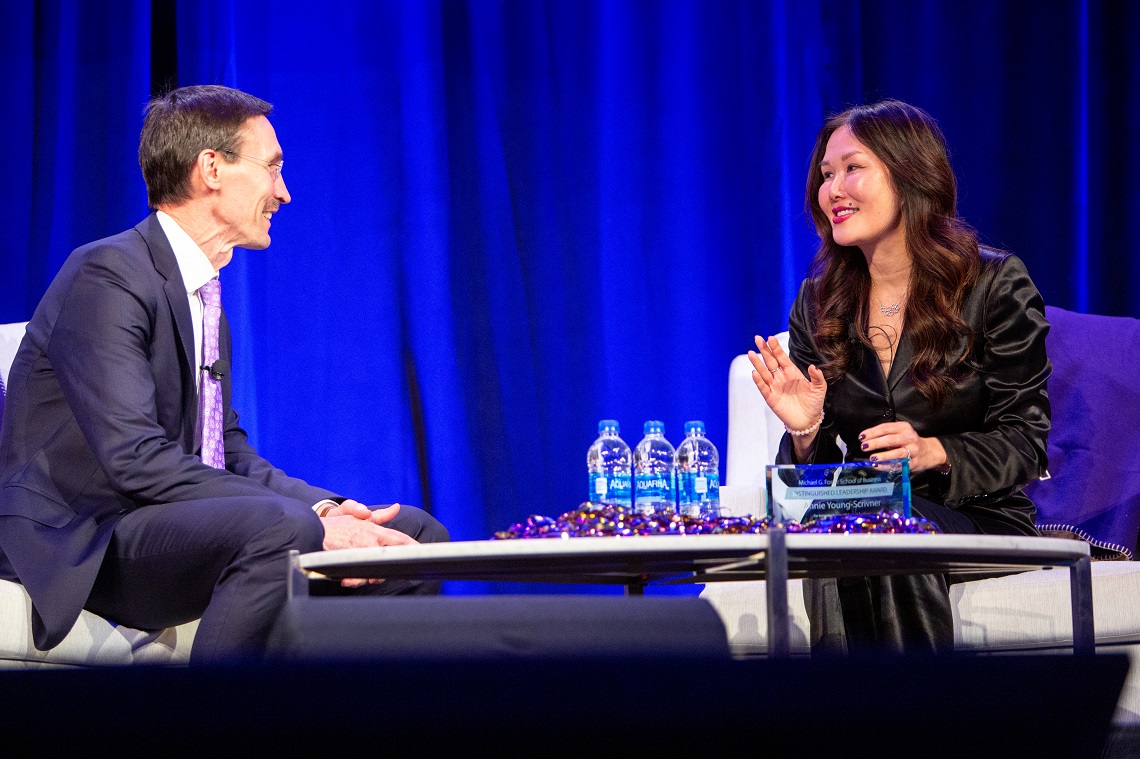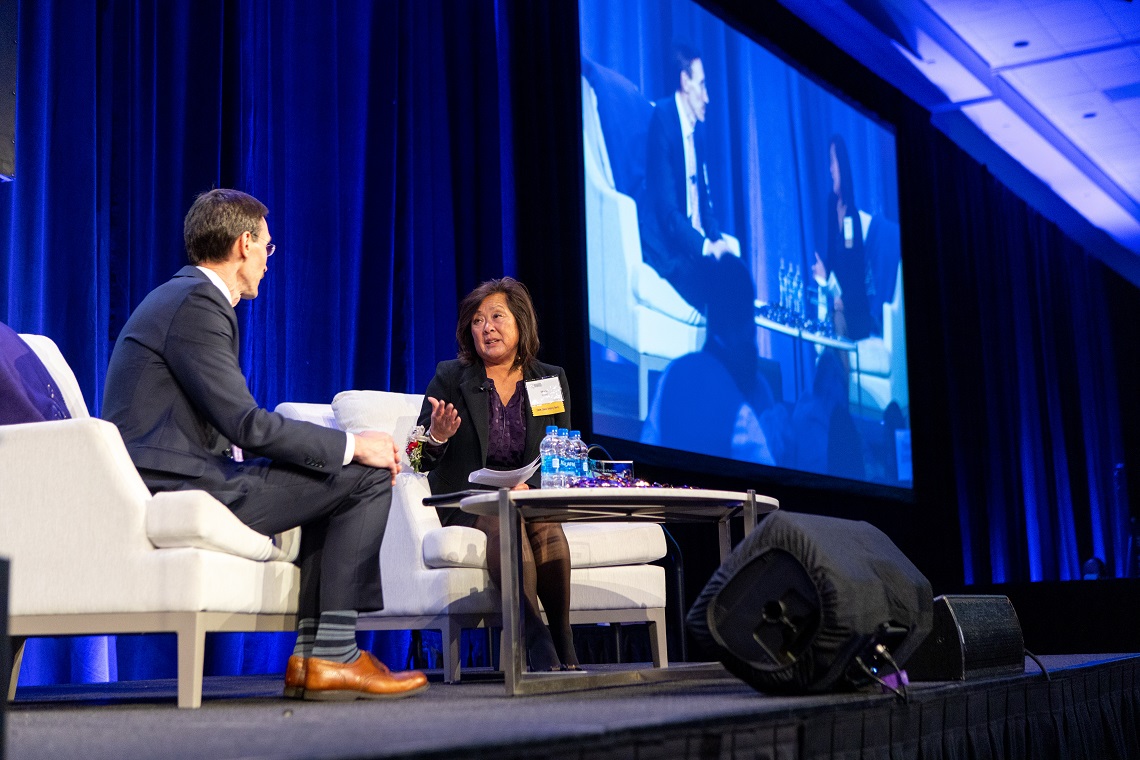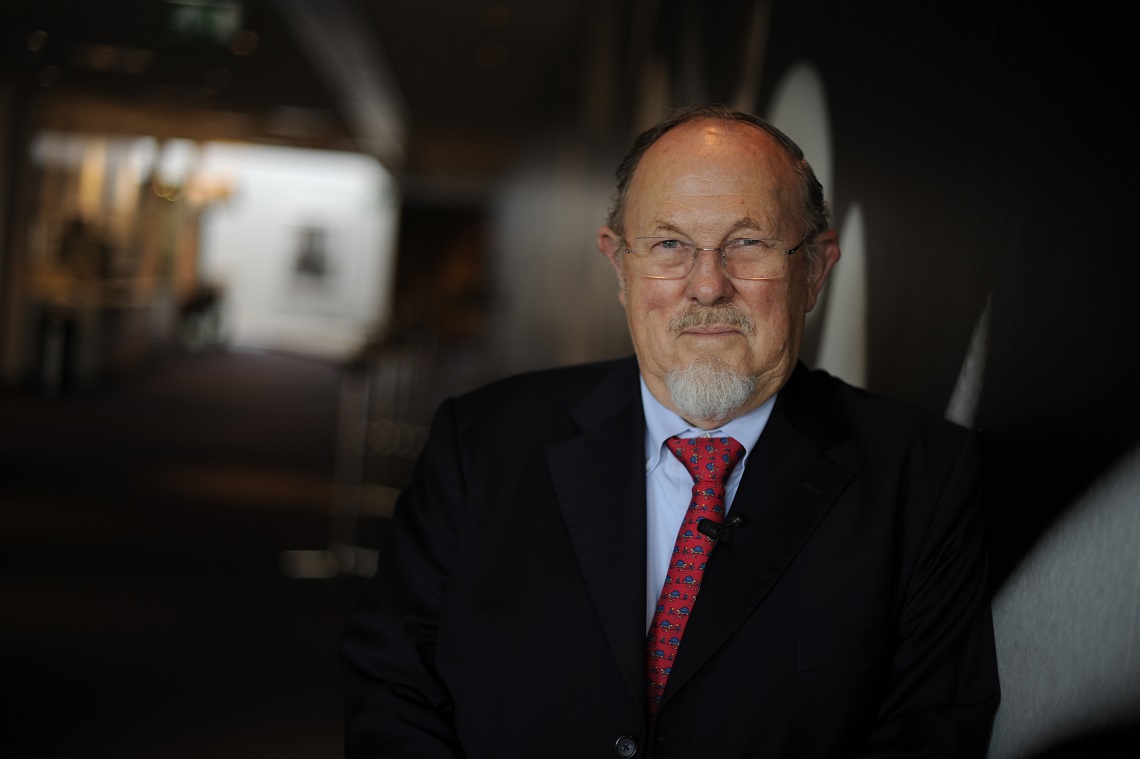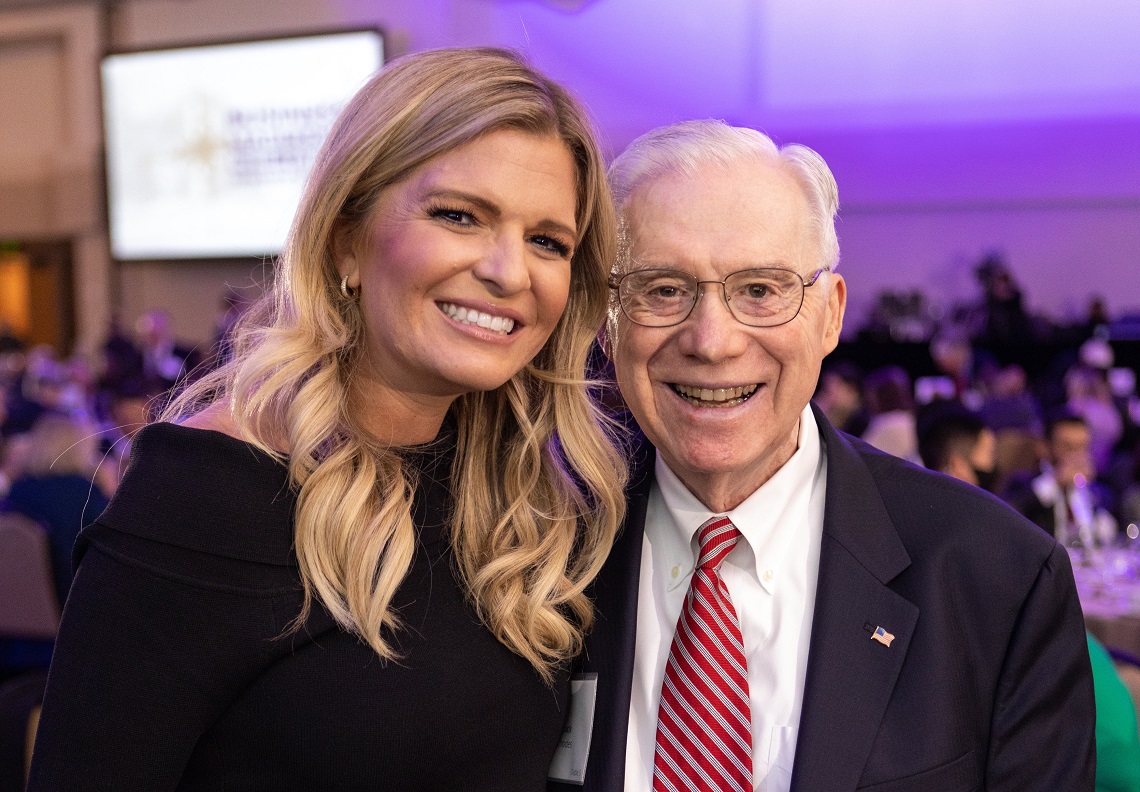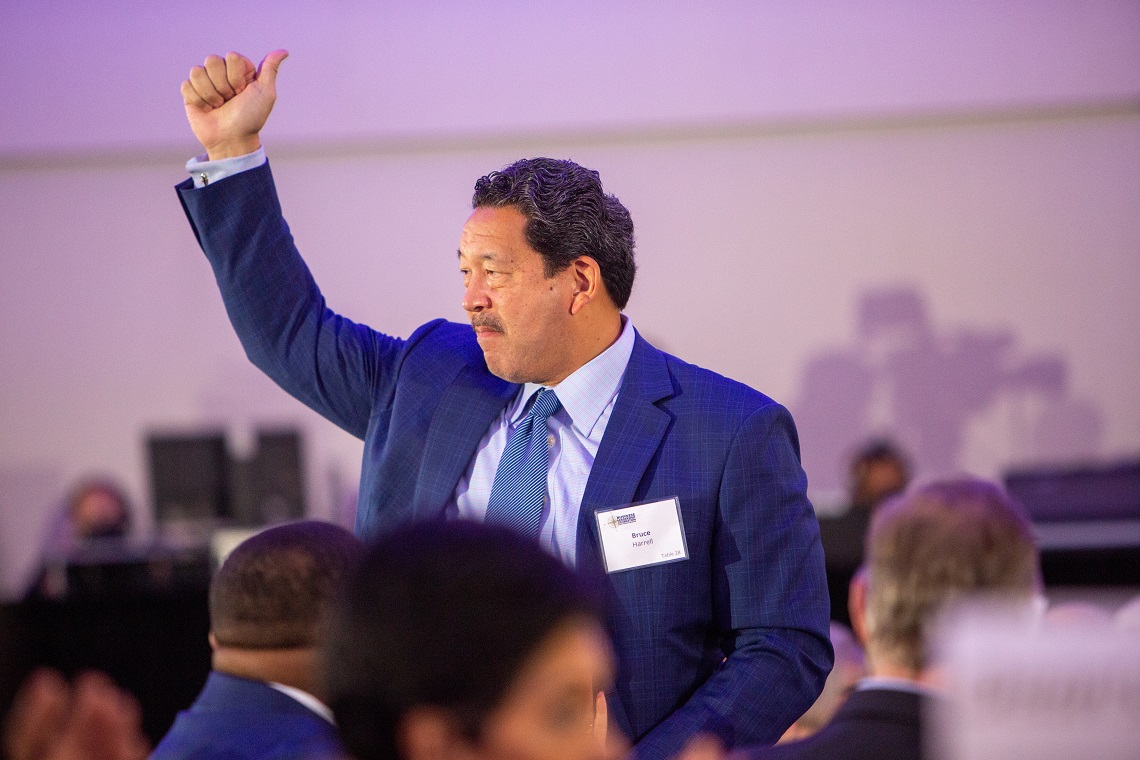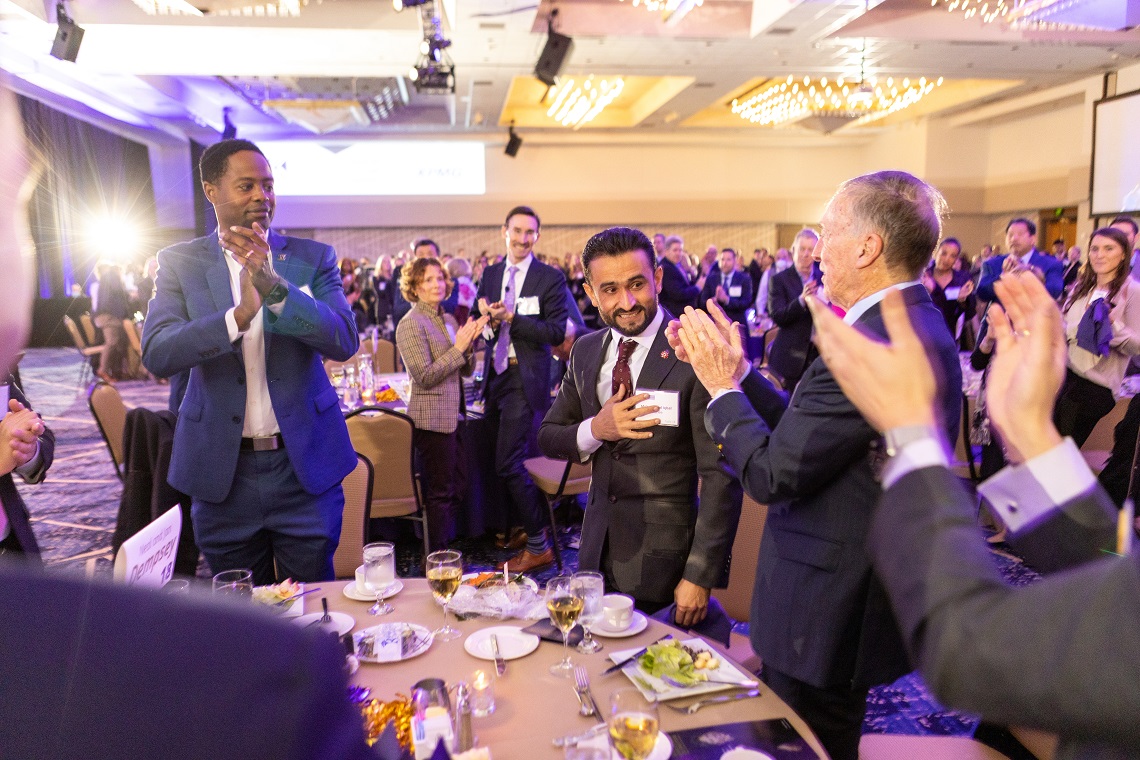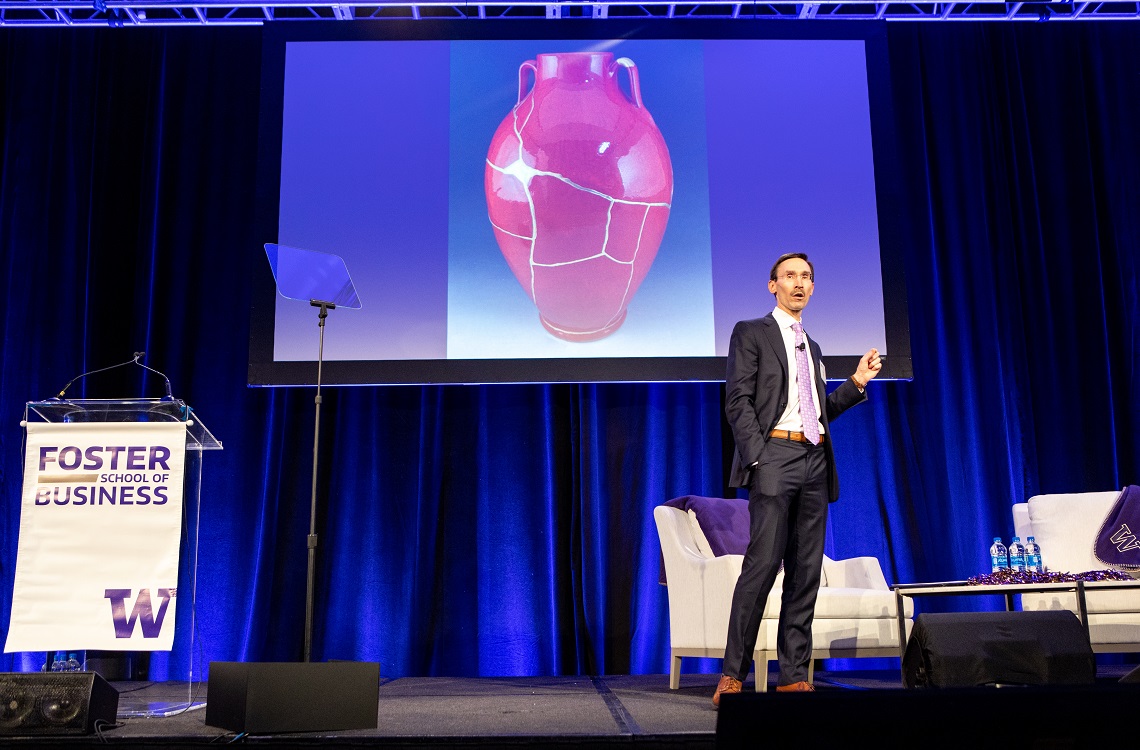Better Together: Business Leadership Celebration honors outstanding leaders, transcendent scholar
BLC is back!
After COVID-19 cancelled a 2020 gathering, the Foster School’s 29th Business Leadership Celebration last night was just that—a true celebration of, well, gathering. In person (following public health protocols, of course). And a demonstration that the school is, indeed, better together.
This year’s celebration was headlined by Indra Nooyi, the former CEO of PepsiCo and current director of Amazon who was named the “Most Powerful Woman in Business” five times by Fortune.
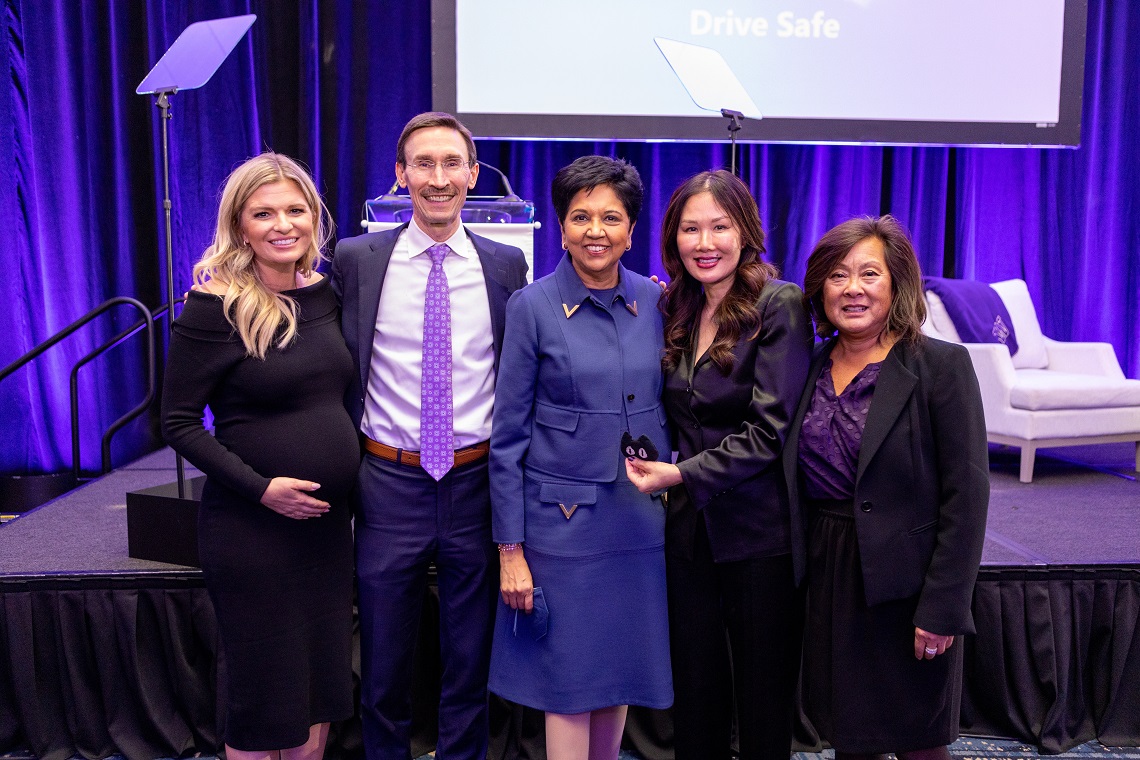
Lindsey Thiry, Frank Hodge, Indra Nooyi, Annie Young-Scrivner and Mary Knell at the 2021 Business Leadership Celebration.
Distinguished leadership Awards were presented to Mary Knell (BA 1982), CEO of Pacific Northwest Commercial Banking at Wells Fargo & Co., and Annie Young-Scrivner (BA 1991), CEO of Wella Company.
A special Scholar of the Century Award honored former Foster finance professor and Nobel laureate William F. Sharpe.
Performance with purpose
Facing stiff headwinds when she took leadership of PepsiCo, Indra Nooyi became the chief architect of “Performance with Purpose,” the company’s mission to deliver sustained growth by making more nutritious products, limiting its environmental footprint, and empowering its associates and people in the communities it serves.
“Performance with Purpose wasn’t about changing the way we spent money,” Nooyi said in her keynote address. “It was about changing the way we made money… Companies don’t exist in a vacuum. They are part of every society in which they operate. And they should not pass costs onto those societies.”
Practicing the principles of Performance with Purpose, PepsiCo delivered strong growth that grew consistently and sustainably over a long period of time. “We made a great company even better,” she said.
Nooyi shared seven critical lessons to leadership that made this success possible:
- Set an inspirational vision – “As written in the Book of Proverbs,” Nooyi says, “when there’s no vision, people perish.” Her version of vision became Performance with Purpose.
- Balance the level and duration of returns – “Think of a company as an inter-generational project. Build companies and institutions that endure.”
- Persuade people to follow your lead – After selling Performance with Purpose to employees around the world missionary zeal, it has become so ingrained in the PepsiCo culture that “if we walked away from it, employees would leave the company in droves.”
- Listen carefully (and assume positive intent) – “There’s a reason that we have two ears and only one mouth. We should do more listening than talking.”
- Be a student for life – “We are living in a period of staggering change. To navigate this change, we need to continually educate ourselves… That means not just reading or taking courses, but also getting out of the office and seeing things up close.”
- Appeal to the heart – “People are everything… In today’s world, you need to engage people not just as employees but also as mothers, fathers, sons and daughters. You need to appeal to their heads and to their hearts.”
- Make time for people who matter the most – “Think hard about how you’re spending your time. We have so little of it. Make the most of your days. And make space for loved ones who matter the most. Because no matter who we are or what we do, nothing can take the place of our families.”
 “These seven lessons translate into the seven characteristics of a great leader: vision, persistence, persuasion, listening, learning, collaborating, humility,” Nooyi concluded. “They also point to a larger question: how can we cultivate CEOs and management teams who strive to be great while also doing good? Moreover, how do we tackle challenges that are inherently long term in nature when the incentives in our society are designed to produce short-term solutions?”
“These seven lessons translate into the seven characteristics of a great leader: vision, persistence, persuasion, listening, learning, collaborating, humility,” Nooyi concluded. “They also point to a larger question: how can we cultivate CEOs and management teams who strive to be great while also doing good? Moreover, how do we tackle challenges that are inherently long term in nature when the incentives in our society are designed to produce short-term solutions?”
Brand master
When asked by Dean Frank Hodge, in an on-stage conversation, to recount her most indelible mentors, Annie Young-Scrivner didn’t have to look far. She got her start under Nooyi at PepsiCo, rising through ranks in sales, marketing and management during her 19 years there.
“You have to read Indra’s book (My Life In Full: Work, Family, and Our Future). It’s such a great, authentic read. There is an incredible lesson in each chapter,” Young-Scrivner said. “Sitting next to her as she solved problems, you came to understand how, as a woman, you could be tough but still have heart. And you could win. And bring others along with you.”
Young-Scrivner has done just that, launching from PepsiCo to a variety of senior executive roles at Starbucks, where she was instrumental in the company’s business turnaround. Then she led Godiva Chocolatier as CEO for three years before joining Wella. She also serves on the board of directors of Tiffany & Co. and Yum! Brands.
As a builder of iconic brands, Young-Scrivner said she has mined gold in Nooyi’s lesson of listening to understand the essence of a brand—what makes it unique, valuable, even beloved. And then she amplifies that essence by leading with innovation, responsibility, heart and passion.
“Let the competitors copy us,” she tells her people. “Because if they do, it will make the industry better and the planet better.”
Trailblazing banker
Equally worthy of emulation is the leadership of Mary Knell. Her career developed at JPMorgan and Bank of America/Seafirst before she joined Wells Fargo, where she leads commercial banking across five states and western Canada.
But as she revealed to the BLC audience, Knell actually got into banking at age 15, working her way through high school and her years “at Balmer Hall” as a teller.
When she was considering career choices, someone asked, “why don’t you apply at a bank?”
“I thought, I want a real job!” she said.
Her first real job at Seafirst turned into a really impactful career—and a platform to become a leader that transcends a single business. Knell is a beacon of the region’s Asian community (and a past executive advisor to Wells Fargo’s global Asian Connection Network). And she serves on the boards of the International Women’s Forum and Washington CEO Roundtable.
She also dedicates herself to the principles of diversity, equity and inclusion, her call to action outlined in a 2020 op-ed in the Puget Sound Business Journal entitled “Diversity and inclusion are not just corporate add-ons.”
“The necessity of accelerating DEI throughout our communities really starts at the top and at every level within our organizations, so that all employees feel valued, trusted, respected and in an environment where they are included and feel they can be at their best,” she says, adding that creating a culture of open dialogue is key. “The better we know each other, the better we can help each other, be better allies and eliminate the biases and systemic issues that hold us back.”
Sharpe insight
While on the Foster School’s finance faculty from 1961 to 1969, William Sharpe’s enormous intellectual curiosity—exploring topics ranging from microeconomics to computer science, investing to statistics— produced two books and 20 published papers. Most notably, his 1964 Journal of Finance study introduced the Capital Asset Pricing Model for calculating the relationship between financial risk and return. This model has proved foundational to modern investing and earned him a share of the 1990 Nobel Prize in Economics.
Sharpe returned to his native California in 1969 and has served on faculty at Stanford ever since. In addition to authoring many books, he also founded the retirement investment firm Financial Engines.
Unable to attend the event in person, Sharpe reflected on his career-defining award by video.
“I always tell people, if they offer you a Nobel Prize, you should take it,” he joked. “There are a lot of really smart people in academics. And there are some who are smart and lucky. I’d like to think I’m in that latter group.”
Special guests
Among the past and present Distinguished Leadership Awardees, Foster Advisory Board members, military veterans and alumni dignitaries in attendance, the evening called for a few special shout-outs from host Lindsey Thiry (BA 2005), an NFL reporter at ESPN.
Thiry, a UW communications alumna and veteran of the Foster School’s Jack and Ann Rhodes Professional Sales Program, applauded founding director Jack Rhodes for instilling in her the core lessons that have proved essential to her career in media.
Seattle Mayor-elect Bruce Harrell (BS 1980, JD 1984) was also in the house. He and his wife, UW Regent Joanne Harrell (BA 1976, MBA 1979), recently donated $100,000 to support student development through the school’s Consulting and Business Development Center.
Finally, an extended standing ovation greeted a very special guest. Lieutenant Colonel Mohammad Iqbal Selanee rose to lead the Afghan army’s most elite commando unit after years serving as a loyal interpreter and advisor to seven U.S. Army units, including the 10th Mountain, 1st Infantry and 101st Airborne Divisions. Selanee was the last fighting commander during fall of Afghanistan to the Taliban. He saved the lives of 1,000 commandos before evacuating his immediate family—with the help of Josh Rodriguez (MBA 2017), an old friend and comrade from his time serving as a reconnaissance officer with the US. Army in Afghanistan who went on to earn a Foster MBA and launch a new career at Goldman Sachs.
Mending vases
Dean Hodge offered a quick state of the school report:
- Founders Hall, Foster’s sustainable new building, is set to open in June.
- Business Minor and Business Badge programs have launched to immediate success.
- Creative Destruction Lab has begun accelerating the computational health industry.
- Foster’s ID (Inclusion and Diversity) Program, led by Christina Fong, the school’s first associate dean for inclusion and diversity, has welcomed Dean’s Impact Scholars Stacia Jones of Lululemon and Martie Burris of Salesforce, and is expanding pipeline programs such as Young Executives of Color, among a broad portfolio of new initiatives.
Reflecting on the emotional and economic toll of the past years of pandemic, Hodge expressed optimism for the future, borrowing the metaphor of a broken vase made wholly new through the ancient Japanese art of Kintsugi.
“Kintsugi is about putting pottery back together so that it is stronger and more beautiful than its original form,” he said. “And that’s my hope for how we can come out of this pandemic: stronger and more beautiful as a community.”
In other words, better together, better tomorrow.
Business community
Foster’s success is powered by many invaluable corporate and individual partnerships, many of which were on display at the Business Leadership Celebration.
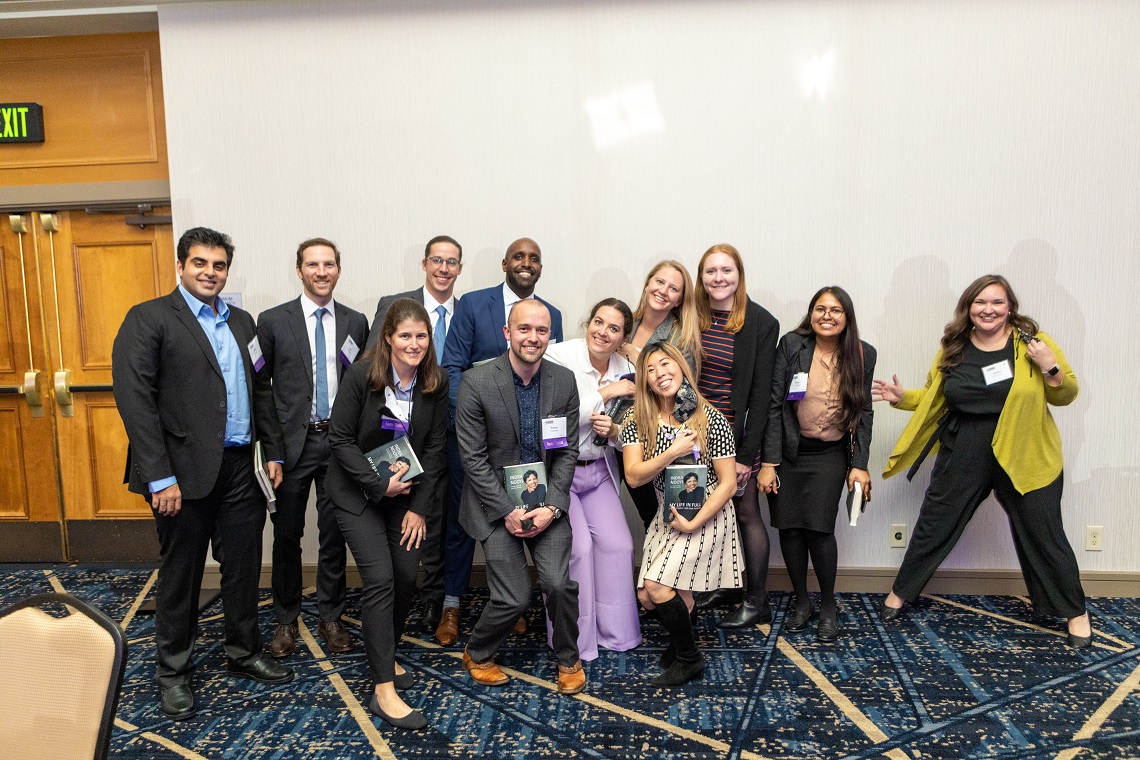 Opportunity Sponsors include American Piledriving Equipment, Inc., Fritzky Family, Gary & Barbara Wipfler, Zevenbergen Capital Investments LLC
Opportunity Sponsors include American Piledriving Equipment, Inc., Fritzky Family, Gary & Barbara Wipfler, Zevenbergen Capital Investments LLC
Table Sponsors include Alaska Airlines, Amazon, Bill Douglas, Cascadia Capital LLC, Charles & Nancy Hogan, Crowley Maritime Corporation, D.A. Davidson, Dan Fulton, Deloitte, Don and Karin Root Family, Dorrit Bern, Eileen O’Neill Odum, EY, Hoffman Construction Company, Holland America Group, Jason & Stephanie Child, John & Kathy Connors, Kemper Development Company, Ken & Mary Denman, KPMG, LMN Architects, Neal & Jan Dempsey, Premera Blue Cross, PwC, RSM US LLP, Saltchuk, Shelley Reynolds, Sunny & Prerna Gupta, Susan Bevan, Via Creatives +, Wella Company, Wells Fargo, Zones, Inc.
Amazon and RSM US LLP are also among the Foster School’s first two DEI Partners, instrumental in the school’s efforts to advance a culture of inclusion, diversity and equity by connecting students to a diversity of leaders and role models within their organizations.
 Each attendee of the 2021 Business Leadership Celebration received a copy of Indra Nooyi’s autobiography courtesy of the Young-Scrivner Foundation.
Each attendee of the 2021 Business Leadership Celebration received a copy of Indra Nooyi’s autobiography courtesy of the Young-Scrivner Foundation.
Net proceeds from the event will help foster leaders at the University of Washington.
The UW Foster School’s margin of excellence is largely due to private support from alumni and friends. If you are considering a gift to Foster before the tax year ends on December 31st, you can browse different areas of support by visiting foster.uw.edu/give.

